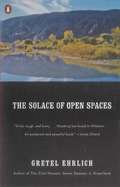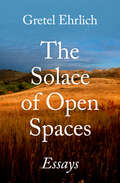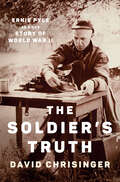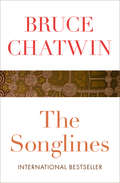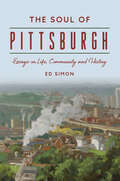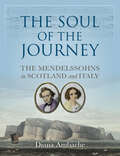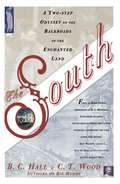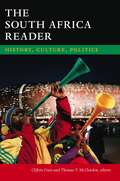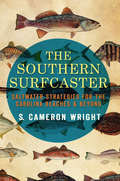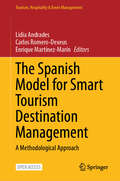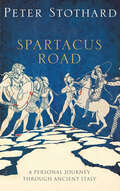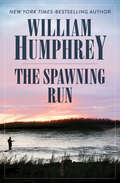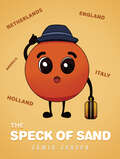- Table View
- List View
The Solace of Open Spaces
by Gretel EhrlichA stunning collection of personal observations that uses images of the American West to probe larger concerns in lyrical, evocative prose that is a true celebration of the region.
The Solace of Open Spaces: Essays
by Gretel EhrlichThese transcendent, lyrical essays on the West announced Gretel Ehrlich as a major American writer—&“Wyoming has found its Whitman&” (Annie Dillard). Poet and filmmaker Gretel Ehrlich went to Wyoming in 1975 to make the first in a series of documentaries when her partner died. Ehrlich stayed on and found she couldn&’t leave. The Solace of Open Spaces is a chronicle of her first years on &“the planet of Wyoming,&” a personal journey into a place, a feeling, and a way of life. Ehrlich captures both the otherworldly beauty and cruelty of the natural forces—the harsh wind, bitter cold, and swiftly changing seasons—in the remote reaches of the American West. She brings depth, tenderness, and humor to her portraits of the peculiar souls who also call it home: hermits and ranchers, rodeo cowboys and schoolteachers, dreamers and realists. Together, these essays form an evocative and vibrant tribute to the life Ehrlich chose and the geography she loves. Originally written as journal entries addressed to a friend, The Solace of Open Spaces is raw, meditative, electrifying, and uncommonly wise. In prose &“as expansive as a Wyoming vista, as charged as a bolt of prairie lightning,&” Ehrlich explores the magical interplay between our interior lives and the world around us (Newsday).
The Solar System: Discover the mysteries of our sun and neighboring planets (Space Explorers)
by Sophie AllanDiscover our expansive solar system in this breathtaking journey into space. This charming book is the perfect introduction for young readers who want to learn about our local star - the Sun - and the planets that orbit it. The Solar System covers space in thrilling detail and is the perfect book for space lovers everywhere. Packed with mind-blowing facts, this incredible book of the solar system is perfect for space lovers everywhere. This fascinating guide introduces 7-9 year-olds to the birth of the Sun and the solar system, then continues on a journey through space. They discover the smallest planet, rocky Mercury, which is closest to the Sun, and Venus, the hottest planet. There is also Mars, with its polar ice caps and volcanoes, and Jupiter, with its swirling storm clouds. Then readers venture further into space to explore the icy giants of outer space. This wonderful solar system book offers:- In-depth information, backed up by space photography, probe images, illustrations, and fun diagrams.- Striking illustrations, making this title a perfect gift, as well as a solid reference book. - Easy-to-digest sections, each filled with incredible facts and visuals.STEM learning, with key topics for 7-9 year-olds: labeled images of each of the planets, clear step-by-step visuals to show the birth of our solar system, accessible facts about space missions.Boasting beautiful illustrations by artist Dawn Cooper, combined with up-to-date images from space agencies such as NASA and ESA, info panels, timelines, and diagrams, that help demystify and explain the spectacles of space, this is the ideal book for budding astronauts.At DK, we believe in the power of discovery.So why stop there?If you like The Solar System, then why not complete the collection? Take a trip into space and discover the mysteries of Earth&’s closest neighbor with The Moon. <P><P><i>Advisory: Bookshare has learned that this book offers only partial accessibility. We have kept it in the collection because it is useful for some of our members. Benetech is actively working on projects to improve accessibility issues such as these.</i>
The Soldier's Truth: Ernie Pyle and the Story of World War II
by David ChrisingerA beautiful reckoning with the life and work of the legendary journalist Ernie Pyle, who gave World War II a human face for millions of Americans even as he wrestled with his own demonsAt the height of his fame and influence during World War II, Ernie Pyle&’s nationally syndicated dispatches from combat zones shaped America&’s understanding of what the war felt like to ordinary soldiers, as no writer&’s work had before or has since. From North Africa to Sicily, from the beaches of Anzio to the beaches of Normandy, and on to the war in the Pacific, where he would meet his end, Ernie Pyle had a genius for connecting with his beloved dogfaced grunts. A humble man, himself plagued by melancholy and tortured by marriage to a partner whose mental health struggles were much more acute than his own, Pyle was in touch with suffering in a way that left an indelible mark on his readers. While never defeatist, his stories left no doubt as to the heavy weight of the burden soldiers carried. He wrote about post-traumatic stress long before that was a diagnosis.In The Soldier's Truth, acclaimed writer David Chrisinger brings Pyle&’s journey to vivid life in all its heroism and pathos. Drawing on access to all of Pyle&’s personal correspondence, his book captures every dramatic turn of Pyle&’s war with sensory immediacy and a powerful feel for both the outer and the inner landscape. With a background in helping veterans and other survivors of trauma come to terms with their experiences through storytelling, Chrisinger brings enormous reservoirs of empathy and insight to bear on Pyle&’s trials. Woven in and out of his chronicle is the golden thread of his own travels across these same landscapes, many of them still battle-scarred, searching for the landmarks Pyle wrote about.A moving tribute to an ordinary American hero whose impact on the war is still too little understood, and a powerful account of that war&’s impact and how it is remembered, The Soldier's Truth takes its place among the essential contributions to our perception of war and how we make sense of it.
The Someday Birds
by Julie Mclaughlin Sally J. Pla<P>The Someday Birds is a debut middle grade novel perfect for fans of Counting by 7s and Fish in a Tree, filled with humor, heart, and chicken nuggets. <P>Charlie’s perfectly ordinary life has been unraveling ever since his war journalist father was injured in Afghanistan. When his father heads from California to Virginia for medical treatment, Charlie reluctantly travels cross-country with his boy-crazy sister, unruly brothers, and a mysterious new family friend. He decides that if he can spot all the birds that he and his father were hoping to see someday along the way, then everything might just turn out okay. <P>Debut author Sally J. Pla has written a tale that is equal parts madcap road trip, coming-of-age story for an autistic boy who feels he doesn’t understand the world, and an uplifting portrait of a family overcoming a crisis.
The Songlines (Picador Bks.)
by Bruce ChatwinInternational Bestseller: The famed travel writer and author of In Patagonia traverses Australia, exploring Aboriginal culture and song—and humanity&’s origins. Long ago, the creators wandered Australia and sang the landscape into being, naming every rock, tree, and watering hole in the great desert. Those songs were passed down to the Aboriginals, and for centuries they have served not only as a shared heritage but as a living map. Sing the right song, and it can guide you across the desert. Lose the words, and you will die. Into this landscape steps Bruce Chatwin, the greatest travel writer of his generation, who comes to Australia to learn these songs. A born wanderer, whose lust for adventure has carried him to the farthest reaches of the globe, Chatwin is entranced by the cultural heritage of the Aboriginals. As he struggles to find the deepest meaning of these ancient, living songs, he is forced to embark on a much more difficult journey—through his own history—to reckon with the nature of language itself. Part travelogue, part memoir, part novel, The Songlines is one of Bruce Chatwin&’s final—and most ambitious—works. From the author of the bestselling In Patagonia and On the Black Hill, a sweeping exploration of a landscape, a people, and one man&’s history, it is the sort of book that changes the reader forever. This ebook features an illustrated biography of Bruce Chatwin including rare images and never-before-seen documents from the author&’s estate.
The Sordid Secrets of Las Vegas
by Paula Munier Quentin ParkerWhether this is your first or fiftieth visit, you'd be surprised at how much of the city's mystique you can miss while you're pulling slots until dawn. From getting comped at a casino every time to finding the best stripper to teach you how to pole dance, you'll learn all of the hidden magic that permeates this incredible city in this tell-all handbook. You'll also get an insider's take on:How to get invited to the Fetish and Fantasy BallWhy you shouldn't drink the water in VegasWhere to have a $5,000 lunch Where to find the world's biggest topless poolWho's been blacklisted by the Gaming Control BoardOrganized according to the seven deadly sins, the hidden gems in this book are your key to uncovering the dirty secrets of Sin City!
The Sorrow of Angels
by Jón Kalman StefánssonIt is three weeks since the boy came to town, carrying a book of poetry to return to the old sea captain - the poetry that did for his friend Bárður. Three weeks, but already Bárður's ghost has faded. Snow falls so heavily that it binds heaven and earth together. As the villagers gather in the inn to drink schnapps and coffee while the boy reads to them from Shakespeare's Hamlet, Jens the postman stumbles in half dead, having almost frozen to his horse. On his next journey to the wide open fjords he is accompanied by the boy, and both must risk their lives for each other, and for an unusual item of mail. The Sorrow of Angels is a timeless literary masterpiece; in extraordinarily powerful language it brings the struggle between man and nature tangibly to life. It is the second novel in Stefánsson's epic and elemental trilogy, though all can be read independently.
The Sorrow of Angels
by Jón Kalman StefánssonIt is three weeks since the boy came to town, carrying a book of poetry to return to the old sea captain - the poetry that did for his friend Bárður. Three weeks, but already Bárður's ghost has faded. Snow falls so heavily that it binds heaven and earth together. As the villagers gather in the inn to drink schnapps and coffee while the boy reads to them from Shakespeare's Hamlet, Jens the postman stumbles in half dead, having almost frozen to his horse. On his next journey to the wide open fjords he is accompanied by the boy, and both must risk their lives for each other, and for an unusual item of mail. The Sorrow of Angels is a timeless literary masterpiece; in extraordinarily powerful language it brings the struggle between man and nature tangibly to life. It is the second novel in Stefánsson's epic and elemental trilogy, though all can be read independently.
The Soul of Pittsburgh: Essays on Life, Community and History (The History Press)
by Ed Simon"Europe stretches to the Alleghenies, America lies beyond." - Ralph Waldo Emerson "They are my people and this is my town and it does my heart good just to be here." - Art Rooney Sr. What does it mean to be from Pittsburgh? Author Ed Simon explores the nature of the Yinzer and how the Steel City shapes anyone who is fortunate to call it home.
The Soul of the Journey: The Mendelssohns in Scotland and Italy
by Diana AmbacheBrother and sister Felix and Fanny Mendelssohn enjoyed a rare bond: they were intimate companions and theirs was one of the most significant musical relationships of the 19th century. They shared and commented on each other’s compositions, each highly appreciative of the other but also offering frank, critical advice. Their travels produced some great music – Felix’s best loved works, the Hebrides Overture and the Scottish Symphony, were inspired by his 1829 visit to Scotland, whilst Fanny’s innovative piano cycle Das Jahr was a musical response to the tour of Italy she made in 1839–40. Combining letters and sketches with an accompanying narrative describing their journeys, this is a wonderful celebration of the two Mendelssohns and a portrait of Scotland and Italy of the time as seen through the eyes of two of the Romantic movement’s most acclaimed composers.
The Sound of One Hand Killing
by Peter Bush Teresa SolanaThe director of an exclusive New Age meditation centre in a fancy Barcelona neighborhood is murdered, a case for twin detectives Borja and Eduard. The murder of a CIA agent simultaneously drags them into an international conspiracy that transports them to China and back. This hilarious mystery novel is a remorseless satire of those practicing pseudo-science and pseudo-spirituality.
The Sound of Seattle: 101 Songs that Shaped a City
by EVA WALKER Jacob UittiThis rockin' paperback explores the musical evolution of Seattle through the lens of 101 songs spanning 80 years, examining the most prominent and important music and musicians to come out of our corner of the country, with a foreword by Pearl Jam legend Mike McCready.KEXP DJ and musician Eva Walker and music writer Jake Uitti take readers on a musical journey, exploring the songs and artists instrumental to developing the "Seattle sound." The authors have curated the ultimate playlist for the Emerald City. It all begins in 1942 when Washington-born Bing Crosby records what will become the world's bestselling single of all time, "White Christmas." From there, readers will delight in a sensory trip through jazz, rock, punk, riot grrrl, pop, rap, grunge, indie, emo, and more, deepening their knowledge and love of the songs that shaped Seattle, and in the process, each of us.Both a love letter and love song to the city, The Sound of Seattle is a visual guide organized by decade, with seminal songs profiled and paired with inventive design reminiscent of a favorite zine or concert poster. Includes interviews with Seattle legends like Heart's Nancy Wilson, as well as sidebars showcasing musical landmarks throughout the city. How has the Emerald City&’s musical output changed and evolved? What is the connective tissue between Ray Charles, Quincy Jones, and Kenny G? Between Melvins, Sleater-Kinney, and Foo Fighters? Between Sir Mix-a-Lot, Macklemore, and Travis Thompson? We're gonna find out!
The South
by B. C. HallA tour through the history, politics, and culture of the South is complemented by interviews with such figures as William Fulbright, Daisy Bates, Rosa Parks, Jimmy Buffett, and Shelby Foote.
The South Africa Reader: History, Culture, Politics
by Clifton Crais Thomas V. McclendonThe South Africa Reader is an extraordinarily rich guide to the history, culture, and politics of South Africa. With more than eighty absorbing selections, the Reader provides many perspectives on the country's diverse peoples, its first two decades as a democracy, and the forces that have shaped its history and continue to pose challenges to its future, particularly violence, inequality, and racial discrimination. Among the selections are folktales passed down through the centuries, statements by seventeenth-century Dutch colonists, the songs of mine workers, a widow's testimony before the Truth and Reconciliation Commission, and a photo essay featuring the acclaimed work of Santu Mofokeng. Cartoons, songs, and fiction are juxtaposed with iconic documents, such as "The Freedom Charter" adopted in 1955 by the African National Congress and its allies and Nelson Mandela's "Statement from the Dock" in 1964. Cacophonous voices--those of slaves and indentured workers, African chiefs and kings, presidents and revolutionaries--invite readers into ongoing debates about South Africa's past and present and what exactly it means to be South African.
The Southern Foodie's Guide to the Pig: A Culinary Tour of 50 of the South's Best Restaurants & the Recipes That Made Them Famous
by Chris ChamberlainA guide to purchasing, preparing, and cooking pork using the culinary traditions of the American South—includes photos, recipes and dining recommendations.Discover some of the essential tips and recipes behind the best pork dishes in the south with Chris Chamberlain, author of the popular The Southern Foodie Cookbook.Arguably the most democratic of all proteins, pork is welcome across the country from a gourmet pork belly dish on the menu of the toniest Charleston bistro to a whole hog roasting in a hole dug in the sand of a beach in LA (Lower Alabama).A geographic tour of the Southern states will showcase restaurants in the region that have special talents when it comes to pork. The chefs and pitmasters have shared some of their most sacred secrets, the actual recipes for the best pork, barbecue and bacon dishes that emerge from their kitchens.Since man cannot live by pig alone, there is also a selection of recipes that are great accompaniments to the pork dishes contributed by the fifty Southern restaurants that are featured.The Southern Foodie’s Guide to the Pig introduces readers to all the parts of this versatile animal and teaches procedures to prepare all sorts of wonderful dishes.
The Southern Foodie: 100 Places to Eat in the South Before You Die (and the Recipes That Made Them Famous)
by Chris ChamberlainThirteen states, 100 chefs and 134 recipes later, one thing is clear: the food of the American South tells a story that spans the distance from New Orleans to Louisville, Little Rock to Charleston, Nashville to Dallas, and every city in between.Meet the people keeping the tradition alive and reinventing the flavors of the South while exploring its evolution of the region&’s best restaurants.Swing down to the Gulf Coast and wade into a chef&’s wonderland of fresh seafood and spicy heat. Check out the culinary creativity in the Carolinas where you&’ll find traditional smoked pork barbecue alongside Southern favorites made with fresh, local produce. Explore the restaurant kitchens of Atlanta and Nashville where the chefs aren&’t shy about fusing comfort food standards with international flair and unexpected techniques. Join food and drink writer Chris Chamberlain for access to the South&’s best recipes and the kitchens where they were developed. In The Southern Foodie, Chamberlain explores the South&’s culinary culture with favorites such as: Jalapeño-and-Cheese-Stuffed Grit Cakes from Mason&’s Grill, Baton Rouge, LARoasted Heirloom Pumpkin with Mulled Sorghum Glaze from Capitol Grille, Nashville, TNCountry Ham Fritters from Proof on Main, Louisville, KYBlue Crab Cheesecake from Old Firehouse Restaurant, Hollywood, SCApricot Fried Pies from Penguin Ed&’s Bar-B-Q, Fayetteville, AR The Southern Foodie you where the South eats and how to create those distinct flavors at home. You&’re sure to rediscover old favorites and get a closer look at the delicious new traditions in Southern cuisine.
The Southern Surfcaster: Saltwater Strategies For The Carolina Beaches And Beyond
by S. Cameron WrightThe Southern Surfcaster will increase your knowledge of fishing and help you develop into a more confident salt-water fisherman. Explore creative techniques and the latest strategies that have transformed the sport over the last decade. Many of the old-school methods of fishing are updated for modern practicality. The Southern Surfcaster will change the way you think and what you thought you knew about salt water fishing.
The Spa Less Traveled
by Gail Herndon Brenda GoldsteinLos Angeles' remarkable ethnic diversity has brought more than exotic food and rich cultural traditions--it's led to a wealth of incredible (and incredibly inexpensive) therapeutic massage treatments. Gail Herndon and Brenda Goldstein, both health-care professionals, spent five years visiting Southern California's Thai, Korean, Chinese, Russian, Japanese, Indian, and Hawaiian spas, and they share the details on their favorites. They explain the treatments and their benefits and tell you where to go, what to expect, how to tip, even where to park and where to eat in the neighborhood. A beautifully photographed and designed gift for adventurous Southern Californians.
The Spanish Model for Smart Tourism Destination Management: A Methodological Approach (Tourism, Hospitality & Event Management)
by Lidia Andrades Carlos Romero-Dexeus Enrique Martínez-MarínThis is an open access handbook that guides destinations on their journey to becoming Smart Tourism Destinations (STDs). Developed by SEGITTUR, a distinguished Spanish State company, and aligned with academia represented by Professor Lidia Andrades, who has brought together recognized international academics with SEGITTUR experts in the field of tourism management to write this groundbreaking book, it offers practical insights and strategies for success. Explore the characteristics and implications of smart destinations, across the five dimensions which structure them: destination governance, accessibility, technology, innovation and sustainability, navigate the transition from traditional tourism management to the innovative smart managerial paradigm, and overcome challenges encountered during the transformative process. Equipping destination managers with essential tools and strategies, this handbook showcases real-life examples of Spanish destinations embracing the smart tourism paradigm. Drawing on SEGITTUR's proven methodology, it provides precise guidance, checklists, and expert recommendations for effective implementation. An invaluable resource for destination managers, tourism professionals, and researchers, it unlocks the full potential of smart tourism destinations.
The Spanish Travelmate
by Lexus Alicia de Benito Harland Mike HarlandThe Spanish Travelmate phrasebook and dictionary gives you a detailed yet easy-to-use A to Z list of English words and phrases with Spanish translations for quick-find reference. There are more than 3500 words and phrases, and the Spanish translations come together with an easy-to-read pronunciation guide. Tap a hyperlink (there are hundreds of them) to go to special sections: travel tips about being in Spain; basic language notes; typical Spanish replies to your Spanish questions; conversion tables. These are features which make the Travelmate the must-have ebook Spanish phrasebook download for the traveller who wants to really communicate. The Spanish Travelmate phrasebook and dictionary also gives you a detailed Spanish menu reader of over 500 items and a dictionary section with translations of over 300 common Spanish signs and notices. This is the little book that's a big help. And a joined-up language experience.
The Spartacus Road: A Personal Journey Through Ancient Italy
by Peter StothardA classicist retraces the ancient journey taken by the Spartacus and his army of rebels through Italy in the first century BC Gladiator War.In the final century of the first Roman Republic, an army of slaves undertook a historic revolt. Led by the gladiator Spartacus, its success was something no one before had ever known. The Spartacus Road is the route along which this rebel army outfought the Roman legions between 73 and 71BC, bringing both fears and hopes that have never wholly left the modern mind. It is a road that stretches through 2,000 miles of Italian countryside and out into 2,000 years of world history.In this inspiring and original memoir, the former editor of The Times, Peter Stothard, takes us on an extraordinary journey. The result is a book like none other: at once a journalist’s notebook, a classicist’s celebration, a survivor’s record of a near fatal cancer and the history of a unique and brutal war. As he travels along the Spartacus road—through the ruins of Capua to Vesuvius and the lost Greek cities of the Italian south—Stothard illuminates conflicting memories of times ancient and modern, breathing new life into one of the greatest stories of the ages.
The Spawning Run
by William HumphreyWilliam Humphrey's delightful chronicle of an angling holiday in Wales celebrates two equally astonishing creatures: the Atlantic salmon and the British fly fisherman In order to mate in the same freshwater stream where it was spawned, the salmon swims one thousand miles or more and overcomes countless obstacles, from trawling nets to twelve-foot-high waterfalls. To catch the King of Fish at the end of its incredible journey, the Anglo-Saxon angler subjects his pride, his bank account, and his taste buds--poached milk, anyone?--to similar dangers. Nine out of ten salmon do not make it back to the sea once their spawning run is finished; nine out of ten sportsmen return to the hotel empty handed when the fishing day is done. And yet, year after year, they return to the rivers and streams of Great Britain--fish and angler both. Why? Perhaps "poor Holloway," who has yet to land a salmon after twenty spawning seasons but whose success rate with the bored wives of more skillful fisherman is scandalously impressive, knows the answer. An elegant blend of fishing narrative, travelogue, and character study, The Spawning Run is a hilarious and heartfelt tribute to the irresistible passions that unite us all: man, woman, and salmon. This ebook features an illustrated biography of William Humphrey including rare photos form the author's estate.
The Speck of Sand
by Jamie JensenJoin The Speck of Sand on an unexpected journey, as it tumbles, flies, and clings to travelers from all over the world.Along the way, The Speck of Sand visits different countries and villages, learning about their unique histories.Use the included maps to follow the travelers and The Speck of Sand as they explore together.
